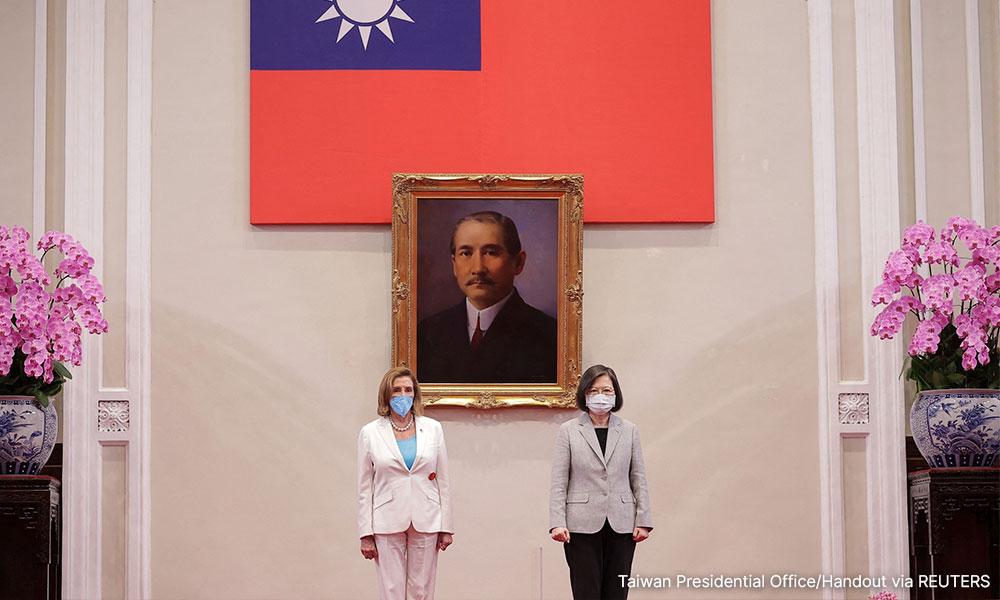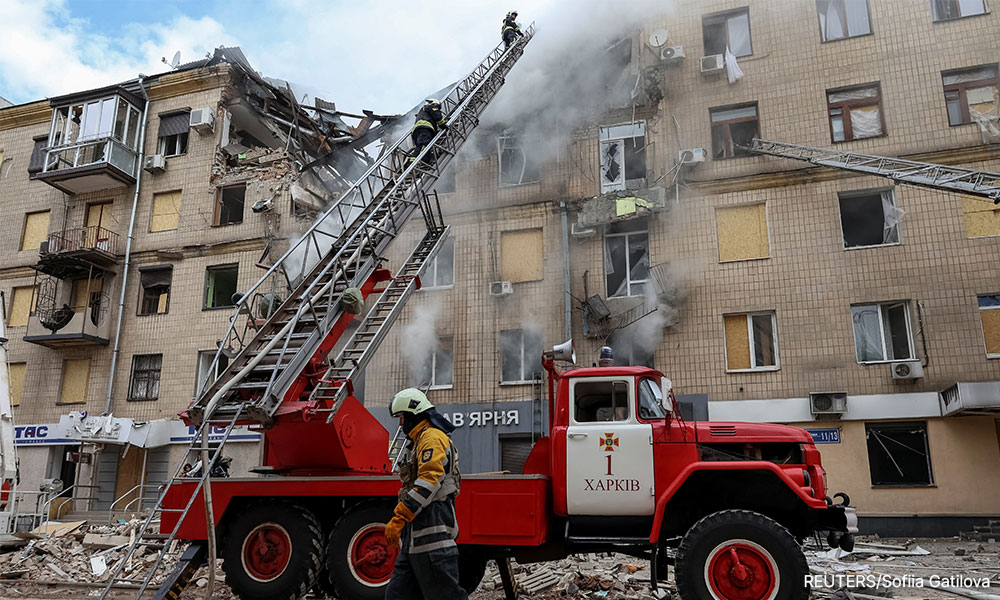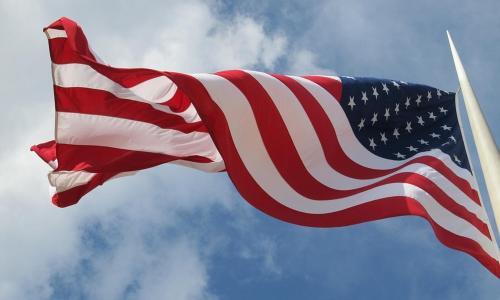LETTER | America is not a warmonger
LETTER | Dr Mahathir Mohamad’s recent statement on America and his call for a greater pivot to China reflect the growing sentiments of anti-West and China-pandering narratives.
The US and the West have been cast as warmongers, out to create global conflicts with an insatiable hunger for provocations to satisfy their interests and military complex. Bashing America has been gaining full traction since the 2013 Iraqi War, with each major global conflict being attributed to Washington and its hawks.
For decades, Western narratives and judgments on peace, freedom and democracy and the sanctity of principles and values have been labelled as hypocritical conduits, propagandistic overtures assigned to win friends and keep them entrenched in facing enemies, especially Moscow and Beijing.
Alternative perspectives and so-called struggles by non-Western ascending powers led by Beijing have been hailed as the needed new breath of hope for the victims of perceived West’s atrocities and global agenda.
Attributions of global conflicts today are pinned on the greed and hidden purpose of the elitist West in creating proxy wars and arms races to meet the needs of its economic and military survival at the expense of the larger global community.
This one-sided narrative has shaped the digested perspective of the masses, here in Malaysia and across the region, further reinforced by Beijing’s strategic and persistent narrative that it intends to play out. This has reverberated across a wide-ranging spectrum of the academia, community, policymakers and the media and business fraternity.
US House of Representatives speaker Nancy Pelosi’s visit to Taiwan was deemed as a provocative venture by Washington out to upset the apple cart and to create hastened tensions across the Taiwan Strait. Overtures in the region, especially military ones, are framed as an unnecessary drive to contain China’s peaceful rise and seeking to stoke further regional tensions and arms race.

The Aukus pact and Quadrilateral Security Dialogue are chastised for fuelling spiralling security dilemmas and a deeper abyss of arms and nuclear race with dangerous consequences.
Strong stances and involvement in regional peace and democratic building framework in promoting idealism of democratic and human rights values are rebuked as yet another hypocritical intent by Washington to interfere in internal affairs of regional players and to dictate the policy orientation to suit its purpose.
Condemnations of human rights abuses and repression in China and in highlighting rampant espionage and cyber theft, among many others, are roundly chastised as a waning power trying to salvage what’s left and trying to weaken others from within.
Resources and aid, with economic institutional shaping and outreach are warily seen as gaining the trust and traction with local communities and policymakers in moulding them to fend off Chinese influence and similar overtures.
Interventions abroad in various measures to save lives from brutal regimes and to uphold peace and democracy are framed as unchecked aggressions out to provoke wars and to sustain its military-industrial complex.
The victim card
The Ukraine war has been almost fully pinned on Nato and Washington’s provocative eastward push in goading the Kremlin into making the ultimate act in justifying their geostrategic and future relevance and purpose.
It is easy to be moulded into this narrative framework, especially when sentiments and contextual understanding are designed by the perceived status of the receiving end, playing the victim card and resonating with the struggle of non-West powers trying to champion their causes and righting the wrongs of the past.
This creates a systemic and ingrained sense of engulfed oppression and injustice, leading to quick affirmation of anti-West portrayal and almost total acceptance of perceived glorified causes espoused by non-West powers in breaking the West’s integrated grip.
Pelosi’s visit and the array of measures for Taiwan are meant to reaffirm decades-old commitment to securing the rights and paths for a peaceful resolution to the crisis and reiterating Washington’s consistent stand that the ideals of peace, democracy and rules-based international order that have been forged and maintained for almost a century must be steadfastly secured.
The US has consistently made clear that there is not change of status quo in its “One China Policy”, while at the same time reaffirms its unshakeable stance that no forceful or intimidating measures will be allowed to alter the present status quo, with documented agreement to supply defensive support for Taiwan and upholding regional peace.
The same goes for its Indo-Pacific pivot, in standing up to Beijing and Moscow’s ingrained strategic efforts to dictate regional orientations to their peripheries of purpose. Bellicose actions and coercive tactics employed against weaker players and in bulldozing their ways in claiming territories through various mechanisms threaten the very foundation of global and regional peace forged through decades-old understanding and adherence to norms and international law.
Moscow’s invasion of Ukraine is a continuation of a series of strategic new regional and global pushes by the Kremlin in charting its new course of power narrative and projection. Never has there been a direct and outright invasion of a sovereign state so bold and damning since the Second World War, and this very act sends a chill down the spine of all players in the world, which causes the beginning of a global arms race and new security orientations to secure their survival and fearing for potential future risks by these rogue players.

Is it justifiable for Washington then to be seen as the devil incarnate in the Ukraine war as it scrambles to stem the tide and salvage the rules-based order of respecting sovereignty and championing peace?
In pointing to the double standards and hypocrisy of America, these players and accusers have more fingers pointing back at them, with a myriad of hypocritical actions in the very same fields of human rights and security considerations.
Counterbalancing overtures and presence in the region have been received with a sigh of relief, albeit discreetly, fearing upsetting Beijing. Players remain committed to being central and non-aligned but continue to admonish the West and Washington for not doing more for the region and for opening up their economies for them.
Chinese incursions have been met with subdued responses and Chinese economic grip has been tolerated for states’ own immediate internal needs at the larger expense of survival and security.
Aid and resources by the billions of dollars received from Washington are deemed as just another normal obligation seen as the needed responsibility of a global major power and, in some cases, cast as irresponsible and insufficient.
Worse, some are framed as laden with hidden costs and agenda to benefit the elites and the deep state in various mechanisms. The list of hypocrisies can go on and on.
Last best hope
Undoubtedly, mistakes are made in carrying the immense weight of responsibilities as the principal upholder of rules, rights and norms and in defending the pillars of peace and democracy, but the true institutional openness and democracy that America embraces makes it possible and needed for self-correction and changes, unlike the autocracies.
Two great wars have been fought in the last century alone, with devastating implications and both the causes and the eventual outcome point to the need for a rules-based international adherence and institutional norms that are pillared on respect for rights and sovereignty and global values of peace and human dignity.
This has been the core essence of the long peace that we have endured since the end of the Second World War, which the US and others have steadfastly created, championed and protected.
For Beijing and Moscow to dispute these systemic order and norms and to impose their versions of so-called alternative global order based on equality and justice, other players are pressured and coerced to fit into this perceived multi-polarity of power sharing and to jettison their affiliation with the US-led order based on the highlighted causes and the victim card.
By blaming Washington as trying to sustain its hegemonic ambition and returns and casting its overtures as evil and insincere, these non-West powers hope to mask their own intent and pursuit while increasing the soft power buy-in with justified cause to their sacrifices in a competition half-won by this agenda sitting alone.
Distorting reality or shaping new politics of emotions might work well in the short term, but the institutional resilience and sanctity of principles and values will stand the test of time and distortions. Enjoying the long peace for decades has created self-complacency and comfort in disregarding the mammoth importance of peace and stability derived from the existing normative law and order and rules-based system unyieldingly created and defended by Washington and the West.
The truth remains that we need America, being the only global power that has both the strength and moral merit to protect global peace and security, oppose aggressions and to continue upholding the entrenched law and order.
Failing any power to stand up to that and lacking the capacity for a counterbalancing force to the new threats, we are doomed to endure a new age of fear, submission and subversion. For now, America remains our last best hope, with the conviction that it will continuously self-improve and self-correct with its own institutional democratic strength, which will bring lasting returns to the world.
The views expressed here are those of the author/contributor and do not necessarily represent the views of Malaysiakini.
RM12.50 / month
- Unlimited access to award-winning journalism
- Comment and share your opinions on all our articles
- Gift interesting stories to your friends
- Tax deductable
